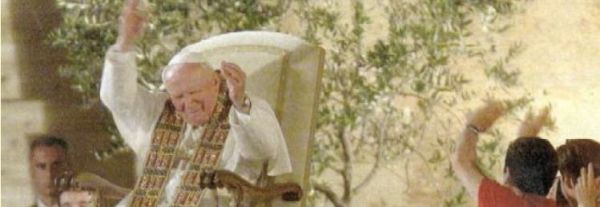2. Dear brothers and sisters! We too, at this hour, pray to the Lord: "Stay with us, for it is becoming evening and the day is already drawing to a close" (Lk 24:29). May this invitation that the disciples of Emmaus address to the Lord guide our festive liturgy today; indeed, the Gospel of this third Easter Sunday leads us on the road to Emmaus. This place is of great importance in the context of the Easter events: it is a place of encounter with Christ, a place of the apparition of the risen Lord.
In the interpretation of the Old Testament peoples, the Passover feast commemorates the "passage" of the Lord, the exodus of the Israelites from the "house of bondage" of Egypt on the way to the promised land. God himself leads, liberates and saves his people. At the beginning of this exodus there had been the sign of the lamb: its blood would mark the houses of the Israelites and save their inhabitants from the punishment of death; its flesh refreshed the Israelites at the last supper before departure.
Animated by this faith of their people, the two disciples of Emmaus had participated in the Passover feast of the Jews of Jerusalem, and had also witnessed the crucifixion of Jesus Christ. When, on the way back, the Lord had appeared to them without them immediately recognising him, he explained to them how the paschal feast of the new covenant had been foretold in the events of the Old Testament; namely, in the exodus from bondage to freedom. This exodus is now fulfilled in the passage from death to life, from sin to friendship with God. And this again happens with the help of a lamb: the Lamb of God, who takes away the sins of the world, Jesus Christ, our Redeemer. Moses and the prophets, even the whole of Scripture, already speak of him and his destiny. That is why the risen Lord could rightly ask: "Did not Christ have to endure these sufferings in order to enter into his glory?" (Lk 24:25f.).
3. Indeed, many statements in the Old Testament predict the events of the Last Supper and Golgotha. These announcements, however, would not have been fulfilled if the paschal events had not taken place at the time and in the manner predetermined by God in Jerusalem. And in spite of all this, Jesus' disciples did not immediately recognise the dramatic and touching event they experienced with their Master during the Passover feast of the Jews in its true meaning and deepest truth. They found it difficult to "believe the word of the prophets" (Lk 24:25f.). This truth was so difficult to recognise for them, who were accustomed to a different understanding of the sacred Scriptures. Why should the Messiah have suffered, been condemned and died on the cross, been despised and mocked as an outcast? Thus, at first, they are as if blinded, discouraged and sad, as if paralysed.
For man it is and will always remain incomprehensible why the way to salvation must pass through suffering. This is why the encounter on the road from Jerusalem to Emmaus is so significant; not only in relation to the Easter events of that time, but for all time - also for us. On this path, the disciples learned from Jesus a new way of reading the sacred scriptures and discovering in them a prophetic testimony about him, a prediction about him, his message and his mission of salvation. Through this teaching, the disciples are instructed by the Lord himself to become his witnesses. Thus Peter, in today's liturgy, bears witness to the Lord's resurrection from this new, deeper understanding of the Easter event before men. In this light of Christ, of the Risen One, he also understands and announces David's psalm: "For you will not forsake my soul in hell" (Acts 2:27).
When Jesus reveals the true meaning of the sacred Scripture to the two disciples on the road to Emmaus, the apostles who are in Jerusalem already know, that this psalm has been concretely realised: "Truly the Lord is risen and has appeared to Simon" (Lk 24:26).
4. The encounter on the road to Emmaus is also of great importance because in this way Jesus emphasised to his disciples, after his death on the cross, that he remains with them. He is with them in spite of or precisely because of the Friday passion and will remain with his Church forever according to his promise: "I will not leave you orphans I will return to you" (Jn 14:18).
Christ is not only who he was, but much more who he is. He was present on the road to Emmaus, and he is also present on all the paths of the world, along which his disciples walk, across generations and centuries.
5. Dear brothers and sisters! From the encounter with the risen Lord on the road to Emmaus, new light descended for the two disciples on the sacred Scriptures and the events of Calvary, new light descended in the darkness of their own lives. Light also descends on the history and destinies of humanity and the Church, and thus also on the Church in Augsburg. Christ showed how the Messiah "had" to suffer, in order to fulfil his saving mission. Is it not true that it is precisely in this light that we are sometimes able to see and understand the darkness and suffering that Christ's disciples and the Church have faced on their journey through history? Through it we are often able to recognise, in trials and sufferings, the good and caring hand of God, which through the experience of the cross leads us to salvation and resurrection.
[Pope John Paul II, homily in Augsburg 3 May 1987]












